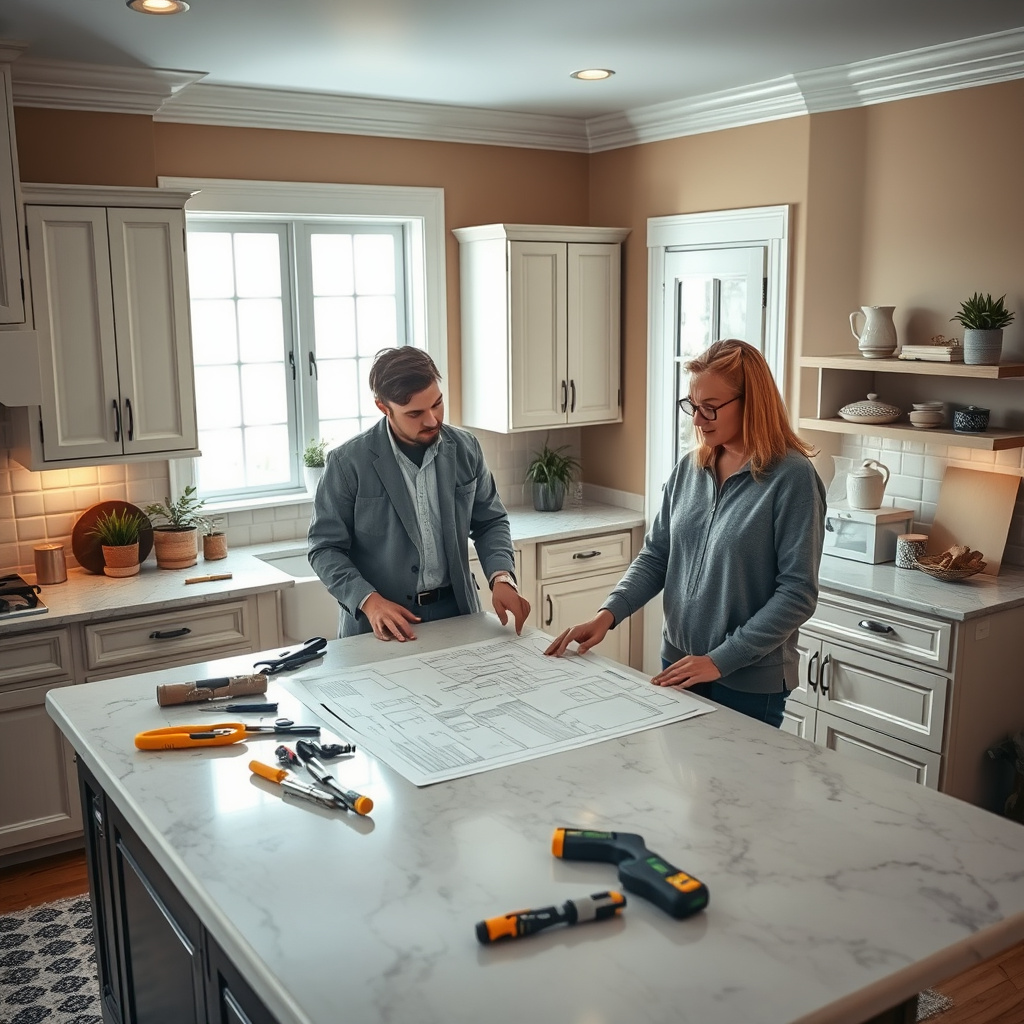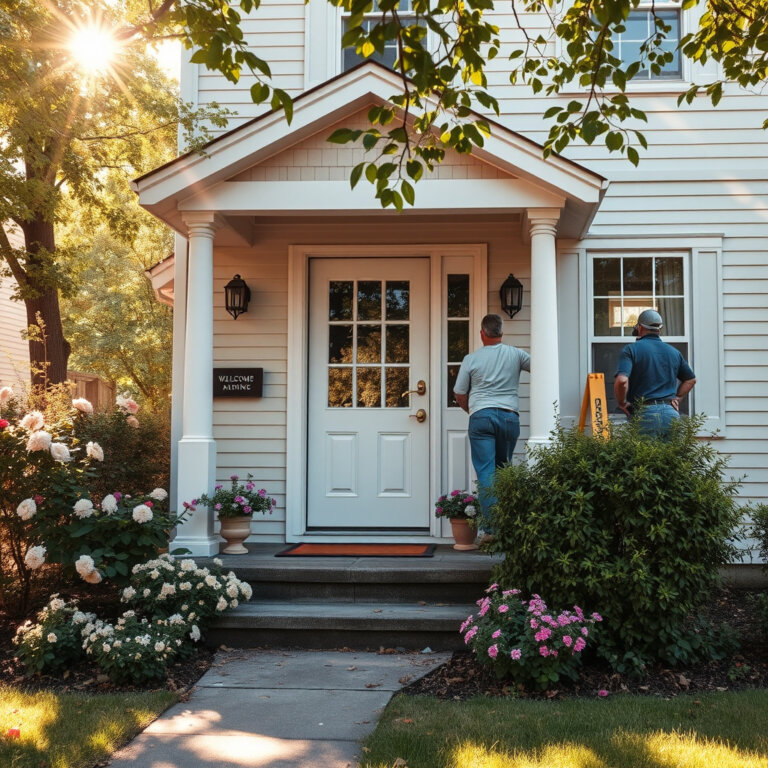Licensed home improvement contractors are professionals certified to perform renovation and construction projects in your home.
Licensed home improvement contractors are essential for anyone planning renovation projects in Massachusetts.
In this post, you will discover how to identify reliable contractors, understand the permitting process, and get insights into cost breakdowns.
Whether you’re a homeowner or a real estate investor, our guide promises to equip you with the knowledge needed to hire the best professionals for your project.
Why Hiring Licensed Professionals Matters for Your Home Projects
When it comes to taking on home projects, whether it’s a simple renovation or a more complex construction endeavor, the choice of who to hire can significantly impact the outcome. This is where the importance of hiring licensed professionals becomes clear. Engaging with licensed home improvement contractors ensures that your project is handled with expertise and care, leading to results that not only meet but exceed your expectations.
Experience and Expertise
Licensed professionals bring a wealth of experience to the table. They have typically completed rigorous training and have acquired the necessary skills to navigate the complexities of home improvement. For instance, when considering a cost of kitchen remodel in Worcester MA, a licensed contractor can provide insights into the best materials and designs that fit your budget while ensuring compliance with local regulations.
Safety and Compliance
One of the critical aspects of home improvement is adhering to safety standards and local building codes. Licensed contractors are well-versed in these regulations and can help you secure necessary permits, such as a home addition permit Boston MA. Skipping this step can lead to fines or even having to redo work, which can be both costly and time-consuming.
Quality Assurance
Hiring a general contractor Massachusetts means you can expect a certain level of quality in the work performed. These professionals are held to high standards and often have warranties for their services. This assurance can provide peace of mind, knowing that your home is in capable hands. For example, if you’re looking at the roof replacement cost Newton MA, a licensed roofing contractor will ensure that the materials used are durable and correctly installed, reducing the likelihood of future issues.
Efficient Project Management
Licensed contractors not only execute the work but also manage the entire project. This includes coordinating subcontractors, scheduling inspections, and ensuring that everything stays on track. Without this level of management, projects can quickly become chaotic, leading to delays and increased costs. If you’re considering home renovation contractors near me, look for those with a proven track record of effectively managing multiple aspects of a project.
Cost-Effectiveness
While it may be tempting to cut costs by hiring unlicensed individuals or attempting DIY solutions, this can often lead to more significant expenses down the line. Mistakes made during the project can require expensive repairs or may not meet local standards, resulting in fines or the need for additional permits. For instance, understanding the cost to build a deck in Boston can vary widely depending on who you hire, and licensed professionals can provide accurate estimates that reflect the true value of their services.
Access to Resources
Licensed contractors have access to a network of suppliers and resources that can help you find the best materials at competitive prices. This network can be invaluable, especially when looking to maximize your budget for projects like a bathroom remodel cost Worcester MA. They often know where to source quality materials that may not be available to the average homeowner.
In the ever-evolving landscape of home improvement, ensuring that you hire licensed professionals is not just a smart choice; it’s essential for the success of your project. From securing the right permits to guaranteeing quality workmanship, the benefits far outweigh any initial savings you might perceive with unlicensed help. Choosing wisely can make all the difference in transforming your home into the space you’ve always envisioned.
Essential Questions to Ask When Choosing a Home Improvement Contractor
When it comes to home improvement projects, selecting the right contractor can make all the difference. To ensure you find a qualified professional, it’s crucial to ask the right questions. Here are some essential inquiries to guide your decision-making process.
1. Are You Licensed and Insured?
Always start by confirming that the contractor is a licensed contractor Massachusetts. This not only guarantees their legitimacy but also indicates that they adhere to local and state regulations. Additionally, inquire about insurance coverage. A reputable contractor should have liability insurance and worker’s compensation to protect you from any potential issues during the project.
2. Can You Provide References?
A reliable contractor should have a portfolio of previous work and be able to provide references from past clients. Don’t hesitate to reach out to these references to ask about their experiences. Were they satisfied with the work? Did the project stay within budget and timeline? This feedback can offer invaluable insights.
3. What Is Your Experience with Similar Projects?
Understanding a contractor’s experience with projects similar to yours is vital. Whether you’re considering a home addition permit Boston MA or a kitchen remodel, ensure the contractor has relevant expertise. Ask them to share examples of similar projects they’ve completed successfully.
4. What Is the Estimated Timeline and Cost?
Get a clear picture of the project’s timeline and overall cost. Discuss potential factors that could affect the schedule and budget, such as obtaining a building permit fees Boston MA or material delays. A professional contractor should provide a detailed estimate and be transparent about any possible changes.
5. How Do You Handle Permits and Inspections?
For many projects, understanding the permit process is essential. Ask how they handle permits, especially if you’re looking into significant renovations. For instance, if you’re considering a cost to build a deck in Boston, make sure they are familiar with local regulations and how to apply for building permits.
6. What Is Your Payment Schedule?
Clarify the payment structure before starting the project. A trustworthy contractor will typically require a deposit upfront, with subsequent payments tied to project milestones. Be cautious of contractors asking for large sums upfront, as this could indicate potential issues.
7. What Is Your Warranty Policy?
Inquire about the warranty on both labor and materials. A good contractor should stand behind their work and offer a warranty that protects you in case of future issues. Understanding the warranty terms can save you from unexpected costs down the line.
8. How Do You Communicate?
Effective communication is key to a successful project. Ask how often you’ll receive updates and what methods they prefer for communication. Knowing whether you can reach them via text, email, or phone will help set expectations and ensure you stay informed throughout the process.
By asking these essential questions, you empower yourself to choose the right contractor for your home improvement project. Whether you’re looking for home renovation contractors near me or need specialized services, being informed will help you make the best decision for your home. Remember, the right contractor can transform your vision into reality while ensuring a smooth process from start to finish.
Navigating the Permit Process for Home Renovations
When it comes to home renovations, understanding the permit process can feel overwhelming. However, with the right approach and a bit of guidance, you can make this journey smoother. Whether you’re planning a simple update or a significant transformation, knowing how to navigate this process is vital.
Understanding the Importance of Permits
Permits are more than just bureaucratic hurdles; they ensure that your renovations meet safety standards and local building codes. This is especially crucial in areas like Boston, where a home addition permit Boston MA might be necessary to ensure that your project aligns with community regulations. When you obtain the right permits, you not only protect your investment but also ensure the safety of your home and its occupants.
How to Apply for a Building Permit
The process of applying for a building permit typically starts with gathering the necessary documentation. This includes detailed plans of your renovation, including architectural drawings, and a list of materials to be used. Here are some steps to guide you through the application process:
- Research local regulations: Different municipalities have different requirements. Check with your local building department for specific guidelines.
- Prepare your plans: Work with your licensed contractor Massachusetts to develop detailed plans that meet all local codes.
- Submit your application: Fill out the necessary forms and submit them along with your plans and any required fees.
- Wait for approval: The review process can take time, so be patient. Your local building department will assess your application for compliance.
Working with Licensed Professionals
Engaging licensed home improvement contractors can simplify the permit process. These professionals are well-versed in local regulations and can help ensure that your project adheres to all necessary codes. They also understand how to navigate the often-complex world of building permits. For example, if you’re considering the cost of kitchen remodel in Worcester MA, a licensed contractor can help you understand what permits you might need and how to apply for them efficiently.
Common Building Permit Fees
It’s essential to budget for the costs associated with obtaining permits. Building permit fees Boston MA can vary widely depending on the scope of your renovation. For instance, larger projects, such as a deck or a roof replacement, might incur higher fees. When planning your renovation, factor in these expenses along with the cost to build a deck in Boston or the roof replacement cost Newton MA.
Final Thoughts on the Permit Process
Navigating the permit process for home renovations is a crucial step in ensuring your project is successful and compliant with local laws. By working closely with home renovation contractors near me, you can ease the burden of paperwork and focus on what truly matters—transforming your home into the space you’ve always envisioned. Remember, being informed and prepared will set you on the right path for a smooth renovation experience.
Cost Breakdown: What to Expect from Your Home Improvement Budget
When embarking on a home improvement project, understanding the cost breakdown is essential for effective budgeting. Knowing what to expect can help you avoid unexpected expenses and ensure that your investment enhances your home’s value.
Understanding Your Budget
Before diving into specific costs, it’s vital to set a realistic budget. This includes not only the direct costs of materials and labor but also potential hidden expenses. Generally, labor can account for 20% to 35% of your total budget, depending on the complexity of the project. For instance, if you’re looking at a cost of kitchen remodel in Worcester MA, remember that hiring a licensed contractor Massachusetts can significantly affect your overall expenses.
Material Costs
Materials typically consume a large portion of your budget. The choice of materials can vary widely in price, so it’s important to research your options. Whether you’re selecting flooring, cabinetry, or fixtures, consider quality and durability. For example, if you’re planning a bathroom remodel, the bathroom remodel cost Worcester MA can vary depending on whether you opt for high-end tiles or more budget-friendly alternatives.
Labor Costs
Labor costs will fluctuate based on the complexity of your project and the experience level of your contractors. Hiring home renovation contractors near me who are experienced and licensed can provide peace of mind and ensure the job is done correctly. In the present market, skilled labor is in demand, which may influence the rates you encounter.
- General contractors typically charge 10% to 20% of the total project cost as their fee.
- Specialized trades, like plumbing or electrical work, may charge hourly rates or per project fees.
- For large projects, consider a flat rate to avoid surprises.
Permits and Fees
Don’t forget to factor in permit costs, which can vary significantly by city. If you’re in Boston, for example, the building permit fees Boston MA should be included in your budget. Understanding how to apply for building permit is crucial to avoid delays during your project. Delays can lead to additional costs, particularly if you’re using a licensed roofing contractor Newton MA who may have other projects lined up.
Contingency Fund
It’s wise to set aside a contingency fund, typically around 10% to 15% of your total budget. This fund can cover unexpected expenses that arise during renovations, such as discovering underlying issues in older homes. For instance, if you’re considering a home addition permit Boston MA, unforeseen structural issues may need to be addressed, leading to additional costs.
Final Thoughts
By understanding these various components of your budget, you can navigate your home improvement project with confidence. From hiring general contractor Massachusetts to managing material costs, being informed will help you make better decisions and ensure your project stays on track financially.
Top Trends in Home Renovation
Home renovation trends are evolving, reflecting a blend of innovation and sustainability. As homeowners look to improve their living spaces, several key themes are emerging in the realm of home improvement. Understanding these trends can help you make informed decisions about your next project, especially when collaborating with licensed contractor Massachusetts and other professionals.
Sustainable Materials
One of the most notable trends is the increasing use of sustainable materials. Homeowners are becoming more conscious of their environmental impact and are opting for eco-friendly options. From reclaimed wood to recycled metal fixtures, these materials not only reduce waste but also add a unique charm to any project. If you’re considering a renovation, think about incorporating these elements for a modern yet responsible aesthetic.
Open Floor Plans
Open floor plans continue to be popular, promoting a sense of space and connectivity within the home. This layout is especially desirable for families and those who enjoy entertaining. By removing unnecessary walls, you can create a more fluid living area that enhances the overall functionality of your home. When planning such transformations, consult with home renovation contractors near me to ensure the structural integrity of your home is maintained.
Smart Home Technology
Integrating smart home technology is another trend gaining traction. From automated lighting to smart thermostats, these features not only enhance convenience but also improve energy efficiency. Homeowners are investing in systems that allow them to control various aspects of their home remotely, making life easier and more efficient. It’s advisable to discuss these options with your general contractor Massachusetts to ensure seamless integration during your renovation.
Outdoor Living Spaces
Creating functional outdoor living areas has become increasingly important. Homeowners are extending their living spaces to the outdoors, incorporating features like decks, patios, and outdoor kitchens. This trend is particularly appealing for those who enjoy hosting gatherings or simply relaxing in nature. If you’re considering a deck addition, be sure to check the home addition permit Boston MA requirements to ensure compliance with local regulations.
Personalized Spaces
The desire for personalized spaces is another significant trend. Homeowners are looking to create unique environments that reflect their personalities and lifestyles. This could involve custom cabinetry in kitchens, bespoke lighting fixtures, or even dedicated hobby spaces. Engaging with experienced home renovation contractors Massachusetts can help you realize these personalized visions effectively.
Budget Awareness
With rising costs in home improvement projects, being budget-conscious is more crucial than ever. Homeowners are encouraged to plan their budgets carefully, understanding the cost of kitchen remodel in Worcester MA or the bathroom remodel cost Worcester MA to avoid surprises. It’s beneficial to have a detailed cost breakdown before commencing any renovation to ensure the project stays within financial limits.
Concluding Thoughts
As you explore these trends, remember that working with a skilled licensed roofing contractor Newton MA or a knowledgeable general contractor Massachusetts can make a significant difference in your renovation experience. Their expertise will not only guide your project but also help you navigate the necessary permits and regulations, such as building permit fees Boston MA and how to apply for building permit. Embrace these trends to create a home that is not only beautiful but also functional and reflective of your style.
How to Evaluate Contractor Proposals Like a Pro
When you’re ready to start a home improvement project, evaluating contractor proposals is a crucial step that can make or break your experience. With so many options available, it’s essential to know what to look for in a proposal to ensure you choose the right professional for your needs. Here’s a guide to help you navigate this important process with confidence.
Understanding the Proposal Components
A solid contractor proposal should include several key elements that provide clarity and transparency. Here’s what to look for:
- Scope of Work: This section outlines what the contractor plans to accomplish. Ensure the details match your project goals.
- Timeline: A clear schedule will help you understand when the work will start and how long it will take, allowing you to plan accordingly.
- Cost Estimate: Look for a detailed breakdown of costs, including materials, labor, and any additional fees. This will help you understand the total investment required.
- Payment Terms: Ensure there is a clear payment schedule, which can help manage your budget effectively throughout the project.
- Licenses and Insurance: Confirm that the contractor holds the necessary licenses, such as a licensed contractor Massachusetts, and has adequate insurance coverage to protect you during the project.
Comparing Proposals Effectively
Once you have multiple proposals in hand, it’s time to compare them. Here’s how to do it like a pro:
- Consistency: Ensure that all proposals address the same scope of work. If one proposal is vague or lacks details, it may indicate a lack of professionalism.
- Pricing: While it’s tempting to go with the lowest bid, consider the value offered. Sometimes, a higher-priced proposal includes better materials or more experienced labor.
- Reputation and Reviews: Research each contractor’s reputation. Look for feedback from previous clients, which can provide insight into their reliability and quality of work.
- Communication: Pay attention to how each contractor communicates with you. A contractor who is responsive and willing to answer your questions is likely to be more professional throughout the project.
Trust Your Instincts
While all these elements are crucial, don’t underestimate the importance of your gut feeling. If something doesn’t feel right about a contractor or their proposal, it’s okay to look elsewhere. After all, this is your home, and you deserve to work with someone you trust.
Final Considerations
In the present climate, understanding how to evaluate contractor proposals effectively can save you time, money, and stress. Whether you’re planning a kitchen remodel or a home addition, take the time to assess your options. By focusing on contractors who are licensed and have a solid reputation, like home renovation contractors near me, you can ensure your project is in capable hands.
When you find the right fit, you’ll not only enhance your living space but also enjoy the journey of transforming your home into what you envision. So, keep these evaluation tips in mind, and you’ll be well on your way to a successful home improvement project.
The Importance of Contracts in Home Improvement Projects
When embarking on a home improvement project, having a solid contract in place is crucial. A well-drafted contract serves as a roadmap for both homeowners and contractors, outlining expectations, responsibilities, and timelines. This not only helps in managing the project efficiently but also protects both parties involved.
Clarity and Understanding
One of the primary benefits of having a contract is that it provides clarity. Home improvement projects can often become complicated, with multiple tasks and various stakeholders. A contract details the scope of work, ensuring that everyone is on the same page. For instance, if you’re planning a kitchen remodel or a home addition permit in Boston MA, the contract should specify the exact tasks, materials, and design elements to be included. This minimizes the chances of misunderstandings or disputes later on.
Legal Protection
Contracts are not just documents; they are legal agreements. If something goes wrong during the project—be it a delay, subpar work, or unexpected changes—a contract provides a legal basis for addressing these issues. It can specify the penalties for not adhering to the agreed-upon terms, thus offering protection for both homeowners and licensed home improvement contractors. This legal safety net can be especially valuable when considering significant renovations, such as a roof replacement cost in Newton MA or a bathroom remodel cost in Worcester MA.
Scope of Work and Payment Terms
A detailed contract clearly outlines the scope of work and payment terms. It should specify the total cost of the project, payment schedule, and any additional costs that might arise. For example, if you’re working with a general contractor Massachusetts on a deck installation, the contract should include the cost to build a deck in Boston and any fees related to permits or unexpected changes. This transparency helps in budgeting and ensures that there are no surprises along the way.
Timeline and Milestones
Another essential component of a contract is the timeline for project completion. Establishing clear deadlines for each phase of the project helps in keeping everything on track. Homeowners can plan accordingly, especially when living in the space being renovated. For instance, if you’re dealing with home renovation contractors near me, having a timeline can help coordinate other aspects of your life, like managing the permit process for home renovations.
Quality Assurance
Lastly, a contract can include clauses related to quality assurance. When hiring construction services Massachusetts, it’s important to ensure that the work meets certain standards. A well-defined contract can specify what materials will be used, the quality of workmanship expected, and any warranties or guarantees offered by the contractor. This not only provides peace of mind but also ensures that the investment made in home improvements is protected.
In the current landscape of home renovations, having a comprehensive contract is more important than ever. It lays the groundwork for a successful partnership between homeowners and contractors, safeguarding everyone’s interests and ensuring a smoother renovation experience. Whether you’re considering a small update or a major renovation project, taking the time to create a detailed contract can make all the difference.
Sustainable Practices in Home Improvement: What You Need to Know
In today’s world, the push for sustainability has permeated every aspect of life, including home improvement. Embracing sustainable practices not only benefits the environment but can also enhance the value and efficiency of your home. Understanding how to incorporate these practices into your home renovation projects is essential for making informed decisions.
Choosing Eco-Friendly Materials
One of the most straightforward ways to promote sustainability in home improvement is by selecting eco-friendly materials. Opt for products made from recycled or renewable resources. For instance, consider bamboo flooring, which is a highly renewable resource, or reclaimed wood for cabinetry and furniture. These choices can significantly reduce your carbon footprint while adding unique character to your home.
Energy Efficiency Upgrades
Improving energy efficiency is another crucial aspect of sustainable home improvement. Upgrading to energy-efficient appliances, installing LED lighting, and choosing Energy Star-rated windows can dramatically lower your energy consumption. These enhancements not only help the environment but also reduce your utility bills over time. If you’re unsure about the energy-efficient options available, consulting with licensed contractor Massachusetts can provide you with tailored solutions for your home.
Water Conservation Techniques
Water conservation is vital in sustainable home improvement. Installing low-flow fixtures, rainwater harvesting systems, or drought-resistant landscaping can significantly reduce water usage. These methods not only conserve a precious resource but may also qualify you for local home improvement grants Massachusetts, making your projects more financially viable.
Smart Home Technology
Integrating smart home technology is gaining popularity as a sustainable practice. Smart thermostats, energy monitors, and automated lighting systems can optimize your home’s energy use. By investing in these technologies, you can have greater control over your energy consumption and make adjustments according to your needs. Consulting with home renovation contractors near me can provide insights into the best technologies suited for your space.
Minimizing Waste During Renovations
Minimizing waste is fundamental to sustainable practices in home improvement. When planning your renovation, consider ways to repurpose existing materials instead of discarding them. Donating usable items to local charities can also be a great way to minimize waste while benefiting your community. Additionally, working with experienced professionals who prioritize sustainable practices can ensure that waste is managed effectively throughout the renovation process.
Understanding Local Regulations
Before embarking on any home improvement project, it’s important to understand local regulations and permit requirements. For example, obtaining a home addition permit Boston MA or understanding building permit fees Boston MA is crucial for ensuring compliance with local codes. Engaging with a knowledgeable general contractor Massachusetts can help navigate these complexities and keep your project on track.
Long-Term Benefits of Sustainable Practices
Investing in sustainable home improvement not only addresses immediate needs but also sets the stage for long-term benefits. Homes designed with sustainability in mind often experience increased market value, making them attractive to future buyers. Furthermore, many sustainable upgrades lead to lower maintenance costs, as they often involve higher-quality materials and technologies.
Incorporating sustainable practices into your home improvement projects is both a responsible choice and a wise investment. By focusing on eco-friendly materials, energy efficiency, water conservation, and smart technologies, you can create a living space that is not only beautiful but also kind to the planet.
Preparing Your Home for a Successful Renovation: Tips and Tricks
Understanding the Process
Renovating your home can be an exciting yet overwhelming journey. To ensure everything goes smoothly, it’s essential to prepare adequately. Begin by understanding the renovation process. Familiarize yourself with the different stages, from planning and design to construction and finishing touches. This knowledge will help you set realistic expectations and manage your time effectively.
Declutter and Create Space
Before your renovation begins, take the time to declutter your home. Remove any unnecessary items from the areas that will be affected by the work. This not only helps create a clean workspace for the contractors but also minimizes the risk of damage to your belongings. Store your items in a safe location, whether that’s a friend’s house or a rented storage unit.
Communicate with Your Contractors
Effective communication with your licensed contractor Massachusetts is vital. Schedule a pre-renovation meeting to discuss your vision, budget, and timeline. Be open about your expectations and any concerns you might have. This transparency will help your contractor understand your needs better and allow them to provide you with the best possible service.
Check for Necessary Permits
Before work begins, it’s crucial to ensure that all necessary permits are in place. Depending on the scope of your renovation, you may need a home addition permit Boston MA or other specific permits. Check with local authorities to understand what is required to avoid any legal issues down the line. Being proactive about permits can save you time and stress later.
Prepare Your Home for Dust and Noise
Renovation projects often come with dust and noise. To protect your home, seal off the area being worked on with plastic sheeting. This will help contain dust and debris. Additionally, consider using rugs or drop cloths in nearby rooms to prevent dust from settling on your furniture. If possible, plan to stay elsewhere during particularly disruptive phases of the renovation.
Set Up a Temporary Living Space
If your renovation is extensive, you might need to set up a temporary living space. This can be as simple as moving into a different room or even a rented apartment. Ensure you have all the essentials in your temporary space, like cooking equipment and bathroom supplies, to minimize disruption to your daily routine.
Budget for Unexpected Costs
While you may have a budget in mind, it’s wise to allocate additional funds for unexpected expenses that often arise during renovations. Hidden issues such as plumbing or electrical problems may surface once the walls are opened up. Being prepared for these surprises can help you avoid stress and keep your project on track.
Research and Choose the Right Materials
Selecting the right materials for your renovation is crucial. Research various options that fit your style and budget. Whether you’re looking at countertops, flooring, or fixtures, consider durability and maintenance. Consulting with your home renovation contractors near me can provide valuable insights into the best materials for your project.
Stay Involved
Throughout the renovation process, remain involved. Regular check-ins with your contractor will help you stay on top of the progress and address any concerns promptly. Being proactive will not only ensure your vision is being realized but can also foster a collaborative relationship with your contractor.
Consider Future Needs
When planning your renovation, think about your future needs. If you anticipate changes in your family size or lifestyle, design your space to be adaptable. Whether it’s an extra bedroom or a larger kitchen, planning for the future can increase the longevity of your renovation investment.
Finalize Your Renovation Plan
As you move closer to the start date, finalize your renovation plan. Confirm all details with your general contractor Massachusetts, including timelines, materials, and costs. Having everything in writing can help protect you and ensure everyone is on the same page.
By taking these steps, you can lay the groundwork for a successful home renovation. Preparing your home and communicating effectively with your contractors will help create an enjoyable and efficient renovation experience.

At Builders RD, our editorial team is made up of construction professionals, researchers, and local content strategists who specialize in home improvement, permitting, and contractor services across Massachusetts. We work closely with industry experts, licensed contractors, and municipal guidelines to deliver accurate, actionable content that helps homeowners, investors, and builders make confident decisions.
Our mission is to simplify the construction process through trustworthy guidance — from permit applications to hiring the right team — so you can build smarter, safer, and with full peace of mind.
— Builders RD Editorial Team






